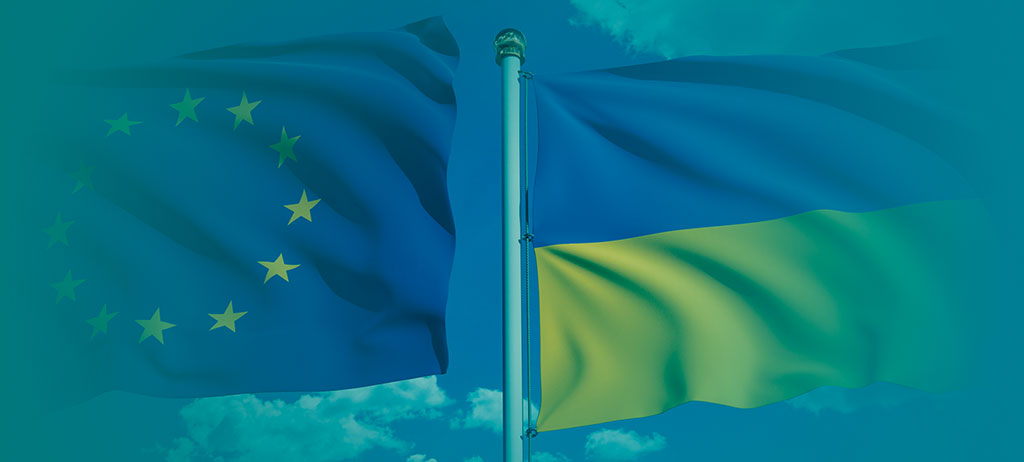Anniversary 1993 - 2023
CNUE's 30 Years

In 2023, the Council of the Notariats of the European Union (CNUE) celebrated its 30th anniversary.
The CNUE has spent thirty years making the voice of European notaries heard, serving not only the interests of the profession, but also those of European citizens, businesses and governments.
Three decades during which the CNUE has continued to work towards the construction of a European area of justice.
The CNUE today
–
The CNUE represents today the notariats of 22 Member States of the European Union, as well as 8 notariats with the status of observer members, in dealings with the European institutions.
The CNUE’s mission is to promote the notarial profession and make an active contribution to the European decision-making process in areas concerning the legal life of citizens and businesses, access to justice and consumer protection.
22 + 8
Members + Observers
50 000
Notaries
200 000
Employees

Signature of the Paris Protocol
1976The Conference of the Presidents of the Notariats of the six founding countries of the European Economic Community (Belgium, France, Germany, Italy, Luxembourg and the Netherlands) was founded in Paris in 1976 with the aim of representing the Latin-type notariat at European level. The memorandum of understanding was signed under the auspices and within the framework of the UINL (International Union of Notaries), an organisation bringing together the Latin-type notariats of the world.

Accession of the Greek notariat
1981Over the years, the CNUE has gradually expanded, with Greece joining in 1981, Spain and Portugal in 1986, and Austria in 1995. In 2004, nine notariats joined the CNUE, at the same time as the EU enlargement, enabling it to take a major step forward from 10 to 19 members. In 2007, Bulgaria and Romania joined, bringing the total number of member notariats to 21 out of the EU’s 27 Member States. On 1 July 2013, the Croatian notariat also joined the CNUE.
The CNUE has 5 observer notariats: Northern Macedonia, Montenegro, Serbia, Turkey and Ukraine.
Accession of the Spanish and Portuguese notariats
1986The Conference of Presidents becomes the Standing Conference of the Notariats of the European Community
1989
Creation of the Brussels Office
1993
Accession of the Austrian notariat
1995The CNUE President’s term of office becomes an annual one
1997
The European notariats are represented within the CNUE by the presidents of the national notarial bodies. They meet at the General Assembly at least three times a year. The General Assembly is the CNUE’s political decision-making body. It takes major strategic and general policy decisions, and adopts political and legal positions vis-à- vis the European institutions. The CNUE is represented by a President, the CNUE’s spokesperson, who – since 1997 – holds office for a period of one year.
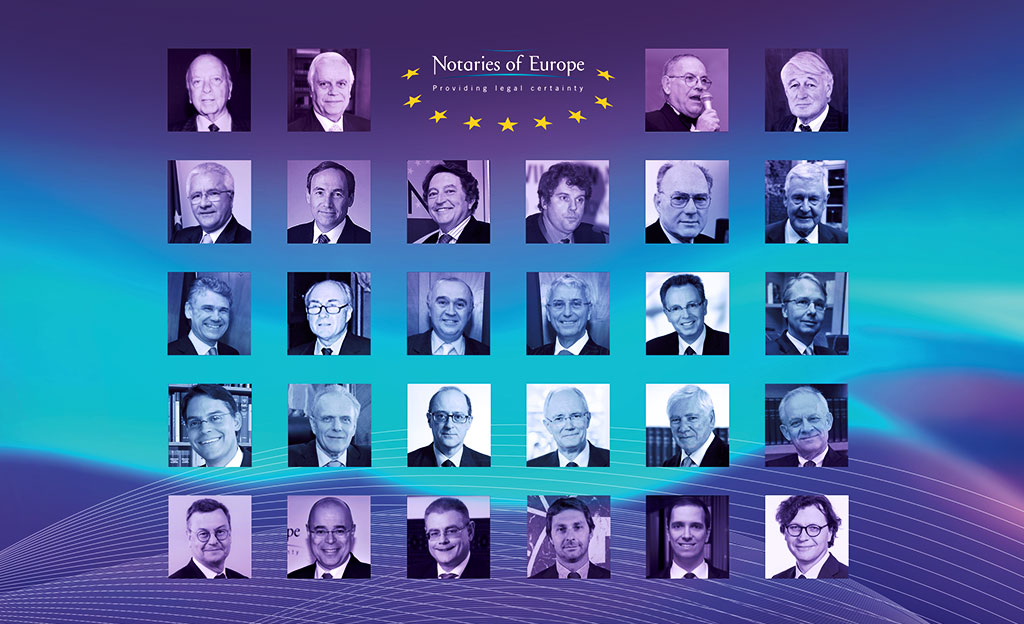
Publication of the book "The Europe of Law"
-
Adoption of the European code of notarial ethic
2002
Launch of the "Formanote" training programme
2003
Accession of the notariats of the following countries: Estonia, Hungary, Latvia, Lithuania, Malta, Poland, the Czech Republic, Slovakia and Slovenia
2004
 1st Congress of Notaries of Europe in Rome
1st Congress of Notaries of Europe in Rome
-
Creation of the ENRWA
2005
In order to ease finding a will in Europe, the Notaries of Europe created the European Network of Registers of Wills Association (ENRWA – www.arert.eu) in 2005. Through this secure interconnection of various national registers, the ENRWA makes it possible to carry out an EU-wide search for the testamentary dispositions of a person who passed away. Following the adoption of European Regulation No. 650/2012 on international successions, the ENRWA is also working on the creation and interconnection of registers of European Certificates of Succession (ECSs). Today, thirteen registers of wills and three registers of ESCs are interconnected thanks to the ENRWA. Each year, the Network records more than 2,500 queries and enables more than 350 wills to be found in a foreign register.

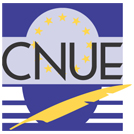
The CNUE becomes the "Council of the Notariats of the European Union"
2006
Accession of the Bulgarian and Romanian notariats
-
Creation of the ENN
2007
In 2007, the CNUE set up the European Notarial Network (ENN). At that time, the ENN was a network of national interlocutors, appointed by their notariats, whose mission was to establish cooperation in order to respond to questions raised by cross-border legal cases. Over the years, the ENN has grown and evolved into a well-functioning IT platform offering practical tools and legal resources to European notaries: www.enn-rne.eu. Today, more than 2,600 notaries from 22 countries work day in, day out to make the Network a reality.
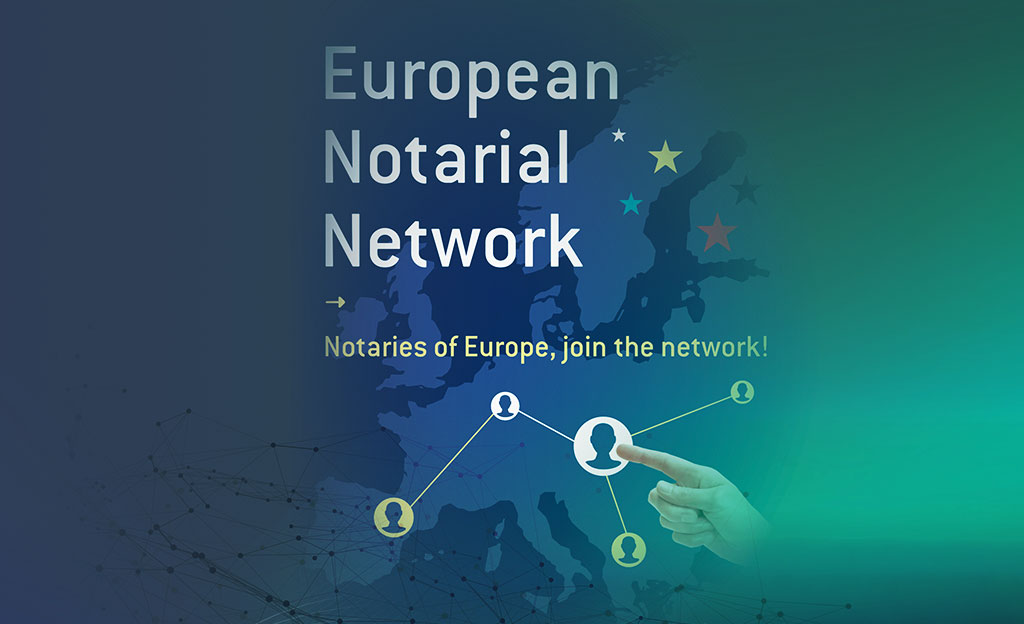

2nd Congress of the Notaries of Europe in Warsaw
2008
"Successions Europe" information website goes online
2010
With the support of the European Union, the CNUE provides citizens with thematic and multilingual websites on which they can find information on the law of the Member States. The first of these websites was launched in 2010, namely the ‘‘Successions Europe’’ website (www.successions-europe.eu),which provides an overview of succession law in the Member States. Since its creation, the site has received several million visits. Building on this success, the CNUE has set up:
2012 – “Couples in Europe”: www.couples-europe.eu
2013 – “Vulnerable in Europe”: www.the-vulnerable.eu
2015 – “Buying property in Europe”: www.buyingmyhome.eu
2018 – “Authentic Acts in Europe”: www.authentic-acts.eu
To ease the search for a notary in Europe, the CNUE launched in 2011 the European Directory of Notaries:
www.notaries-directory.eu.
This website is available in 23 languages and lists some 50,000 notaries in Europe.
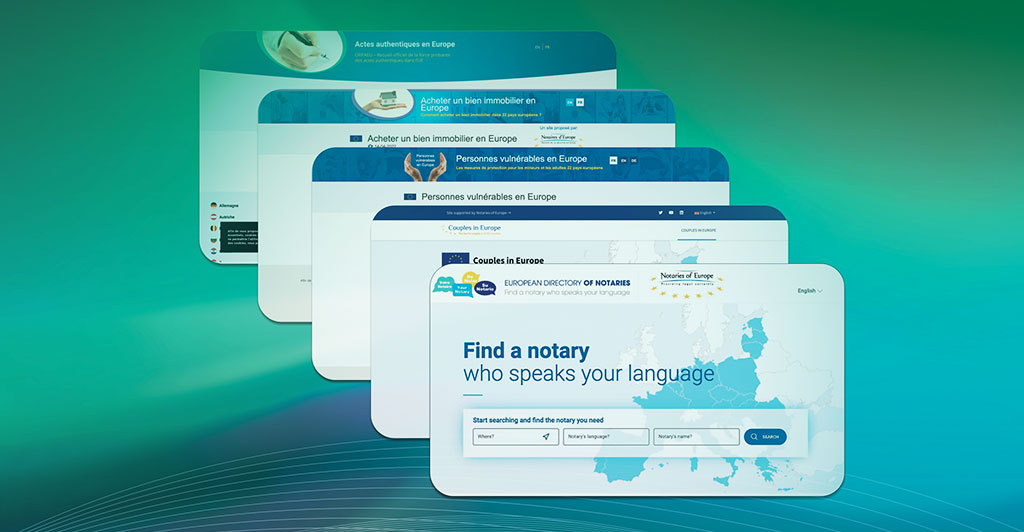
3rd Congress of the Notaries of Europe in Brussels
—
Creation of the European Directory of Notaries
2011

"Couples in Europe" website goes online
2012
Accession of the Croatian notariat
2013
First edition of the "Europe for Notaries
-
Notaries for Europe" training programme
2014
The CNUE pays particular attention to the training of European notaries. Since 2014 and with the support of the European Union, several thousand notaries have been able to follow training courses offered by the CNUE in priority areas of European law such as succession law, family law, company law or the fight against money laundering.
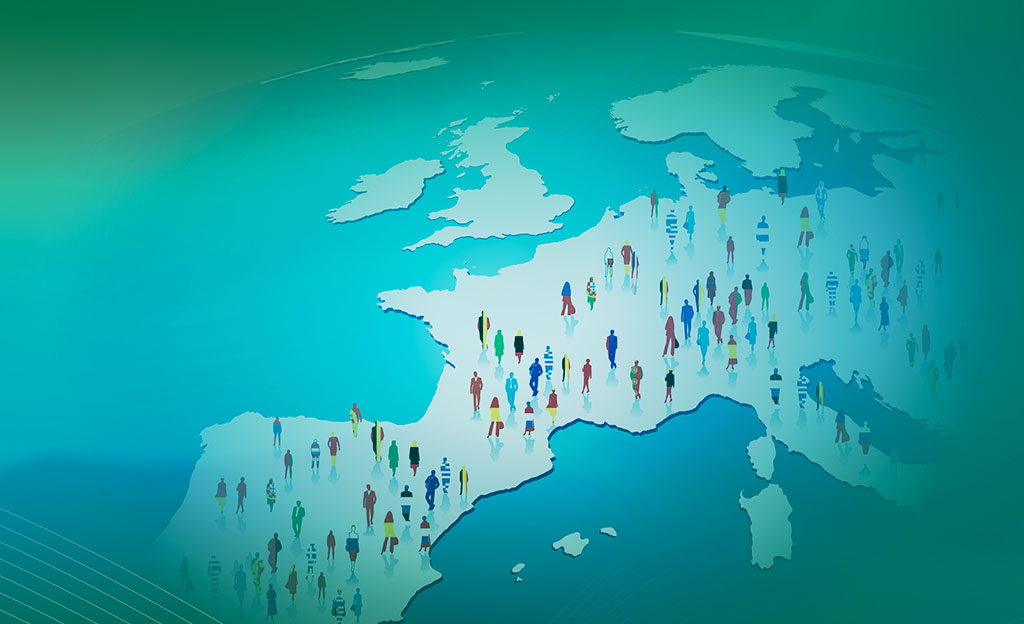
The Europe Regulation on international successions comes into force
2015The CNUE’s ‘‘raison d’être’’ is the promotion of the notariat and its active contribution to any decision-making process of the European institutions that affects the legal life of citizens and businesses, their access to justice and the fight against money laundering and terrorist financing.
Important pieces of legislation have been adopted over the last two decades to build bridges between national civil and commercial law systems, such as the European regulations on international successions, matrimonial property regimes, registered partnerships and the circulation of public documents.
1st Notaries of Europe Open Days as part of the European Day of Justice
20164th Congress of the Notaries of Europe in Santiago de Compostela
2017

"Authentic acts in Europe" website goes online
2018
Organisation of the "Europe Enacted" exhibition at the European Parliament
2019
An accelerating digital transition
2020
The Covid-19 crisis has put a severe strain on the judicial systems of the Member States. Faced with this challenge, the Notaries of Europe took action to ensure that their activities could continue throughout Europe. New procedures were tested and proposed based on a solid foundation that had been in place for several years: the creation and interconnection of registers, the dematerialisation of data transfer, setting up companies online, the deployment of e-signatures, electronic authentic instruments, video conferencing and others.
The COVID-19 crisis has also highlighted the need for a coherent legislative framework at European level. The European institutions are working to achieve this through digitalisation of cross-border judicial cooperation, revision of the European e-IDAS/e-ID Regulation, upgrading of digital company law, etc. As a key player in the digitalisation of justice in Europe, the CNUE is working to ensure that trust and legal certainty also remain essential parts in the digital world.
The Ukrainian notariat joins as an observer member
2022
On 24 February 2022, the international community witnessed the Russian Federation’s invasion of Ukraine, a free country, a democracy. In response to the brutality of these actions, the CNUE quickly mobilised to provide an institutional and on the ground response to the crisis. On 1 March 2022, the Ukrainian Chamber of Notaries was granted observer member status of the CNUE. Within the framework of the European Notarial Network (ENN), the CNUE has developed and published a practical hand book on Ukrainian law for notaries, as well as a series of information sheets on Ukraine for the general public. In addition, the CNUE has published an electronic multilingual form to safeguard the interests of unaccompanied Ukrainian minors, who find refuge in EU countries with relatives and friends. Finally, the Notaries of Europe also play a leading role in the implementation of sanctions against Russia. It is one of the CNUE’s top priorities to support the preventive administration of justice in times of war and its reconstruction in Ukraine after the war.
